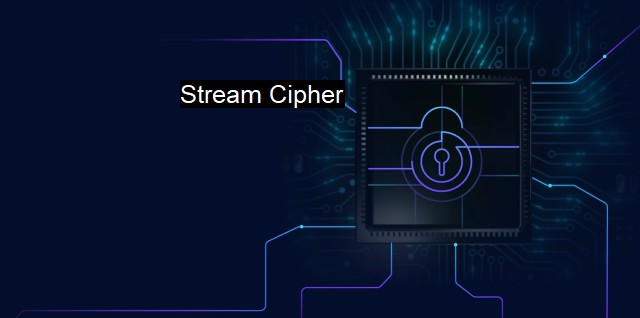What is Stream Cipher?
Stream Ciphers and Their Role in Cybersecurity: An Insight Into Their Implementation in Antivirus Software
Stream Cipher is a fundamental concept particularly with respect to encryption protocols that secure our data and communication systems. From safeguarding online transactions to securing files on our computers, it plays a significant role in information security. With escalating cyber threats, understanding and applying concepts like "Stream Cipher" is imperative to ensure a strong first line of defense in the ever-changing landscape of cybersecurity.So, what exactly is a Stream Cipher? it is an encryption method. Simply speaking, encryption is the process of converting readable data (plaintext) into a form (ciphertext) that makes it nearly impossible for unauthorized users to make sense of it without the decryption key. Stream Cipher is one such encryption method where plaintext digits are combined with a pseudorandom cipher digit stream or a 'keystream'.
In a stream cipher, each plaintext digit is encrypted one at a time with the corresponding digit of the keystream, to give a digit of the ciphertext stream. An important characteristic of the stream cipher is that the transformation of the successive digits varies during the encryption process, making it especially potent against threats. the essence lies in achieving an entirely (ideally) random keystream, failing which, vulnerabilities may be exposed to the attackers.
In its simplest form, a Stream Cipher uses an encryption algorithm that creates a keystream directly from the secret key. The keystream is then combined with the plaintext bits one bit or byte at a time to create ciphertext. Notably, a keystream is dependent on the initialization vector (IV) and the secret encryption key provided by the user or system. The sensitivity and confidence of the encryption increase considerably with a long and random key making it more secure and justifying the performance overhead.
The remarkable characteristic of Stream Ciphers is that they can execute with remarkable speed and are immune to 'error propagation'. If you mistakenly modify one bit or byte while using the Stream Cipher, only that particular byte is affected, and the rest of the data remain fairly unaffected. The implication of this feature is wide-reaching, making Stream Cipher the preferred method in 'real-time' and hardware applications.
Consider an antivirus system; at its heart, antiviruses essentially need to spy on all activities happening within a network. Now, knowingly we wouldn't want systems prying on most of our data unless it's malicious. This is where our hidden knight, Stream Cipher, would encrypt the information, making it effortlessly pass through the network securely anywhere in the world.
Although Stream Ciphers have fallen out of favor in certain usage applications due to vulnerabilities that can expose sensitive information to potential attackers, they are still widely adopted due to the 'real-time' encryption they offer combined with a reduced hardware footprint. Synchronous stream ciphers, where a message does not have to be transmitted over again for decryption, are examples of Stream Ciphers that are still used. Asynchronous or self-synchronizing Stream Ciphers, which can correct synchronization errors automatically, have been criticized for not providing enough security assurance.
To summarize, Stream Cipher is a critical cryptosystem currently under extensive investigation given its efficiency in swapping speed and error non-propagation. While it does present some vulnerabilities, its vital role in securing 'real-time' systems and antiviruses indicates continuous research and development efforts towards bolstering the Stream Cipher cryptosystems. Despite the existence of other cryptosystems, the symbiosis between technology, speed, and security makes the understanding of Stream Ciphers an integral part to comprehend the broader canvas of cybersecurity.

Stream Cipher FAQs
What is a stream cipher?
A stream cipher is a type of encryption algorithm that encrypts data one bit at a time. Unlike block ciphers, which encrypt data in fixed-length blocks, stream ciphers use a key to generate a stream of cryptographic bits which are then combined with the plaintext to produce ciphertext.How secure are stream ciphers for cybersecurity?
Stream ciphers are considered to be very secure for cybersecurity purposes, especially when used properly with strong encryption keys. However, like any encryption method, their security can be compromised if the key is weak or if the encryption algorithm itself is vulnerable to attack.What is the difference between a stream cipher and a block cipher?
The main difference between stream ciphers and block ciphers is how they encrypt data. Stream ciphers encrypt data one bit at a time, while block ciphers encrypt data in fixed-length blocks. Block ciphers are generally considered to be more secure, but stream ciphers are faster and more efficient for encrypting large amounts of data in real-time applications such as video streaming.How do antivirus programs use stream ciphers?
Antivirus programs can use stream ciphers to encrypt and protect sensitive data that is being transmitted over the internet or stored on a local machine. They can also use stream ciphers to encrypt malware signatures or other data that needs to be kept secret to prevent cybercriminals from reverse-engineering the program's defenses.| | A | | | B | | | C | | | D | | | E | | | F | | | G | | | H | | | I | | | J | | | K | | | L | | | M | |
| | N | | | O | | | P | | | Q | | | R | | | S | | | T | | | U | | | V | | | W | | | X | | | Y | | | Z | |
| | 1 | | | 2 | | | 3 | | | 4 | | | 7 | | | 8 | | |||||||